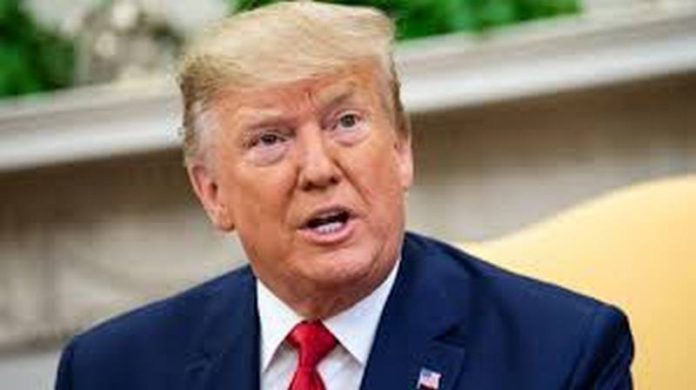The US House of Representatives has impeached President Donald Trump for “incitement of insurrection” at last week’s Capitol riot.
Ten Republicans sided with Democrats to impeach the president by 232-197.
But his trial in the Senate will not happen until after Joe Biden, a Democrat, is inaugurated as the new US president next week.
Mr Trump, a Republican, is the first president in US history to be impeached twice.
The Democratic-controlled House voted on Wednesday after two hours of impassioned debate as armed National Guard troops kept watch inside and outside the Capitol.
The FBI has warned of possible armed protests planned for Washington DC and all 50 US state capitals ahead of Mr Biden’s inauguration on 20 January.
In a video released after the vote in Congress, Mr Trump called on his followers to remain peaceful, without mentioning his impeachment. “Violence and vandalism have no place in our country… No true supporter of mine would ever endorse political violence,” he said, striking a sombre and conciliatory tone.
What was Trump charged with?
Impeachment charges are political, not criminal. The president was accused by Congress of inciting the storming of the Capitol with a speech on 6 January to a rally outside the White House.
He urged his supporters to “peacefully and patriotically” make their voices heard, but also to “fight like hell” against an election that he falsely told them had been stolen.
Following Mr Trump’s remarks, his supporters broke into the Capitol, forcing lawmakers to suspend certification of election results and take shelter. The building was placed on lockdown and five people died in the melee.
The article of impeachment stated that Mr Trump “repeatedly issued false statements asserting that the presidential election results were fraudulent and should not be accepted”.
It says he then repeated these claims and “wilfully made statements to the crowd that encouraged and foreseeably resulted in lawless action at the Capitol”, leading to the violence and loss of life.
“President Trump gravely endangered the security of the United States and its institutions of government, threatened the integrity of the democratic system, interfered with the peaceful transition of power, and imperilled a coequal branch of government.”
Last week, 139 Republicans voted against accepting the result of the 2020 election and Mr Trump’s defeat.
What did lawmakers say during the debate?
Members of Congress made statements for and against the vote in the same chamber where they hid under chairs and donned gas masks as rioters tried to force their way inside last week.
House Speaker Nancy Pelosi, a Democrat, said on the House floor: “The president of the United States incited this insurrection, this armed rebellion against our common country.
“He must go. He is a clear and present danger to the nation that we all love.”
Democratic congressman Julian Castro called Mr Trump “the most dangerous man to ever occupy the Oval Office”.
Most Republicans did not seek to defend Mr Trump’s rhetoric, instead arguing that the impeachment had bypassed the customary hearings and calling on Democrats to drop it for the sake of national unity.
“Impeaching the president in such a short time frame would be a mistake,” said Kevin McCarthy, the House’s top Republican.
“That doesn’t mean the president’s free from fault. The president bears responsibility for Wednesday’s attack on Congress by mob rioters.”
Jim Jordan, an Ohio Republican, accused Democrats of recklessly dividing the country to pursue a political vendetta.
“This is about getting the president of the United States,” said Mr Jordan. “It’s always been about getting the president, no matter what. It’s an obsession.”
Among members of the president’s party who voted to impeach him was the third-ranking House Republican, Liz Cheney.
The Wyoming representative, who is the daughter of former Vice-President Dick Cheney, said of the Capitol riot that “there has never been a greater betrayal by a president”.

